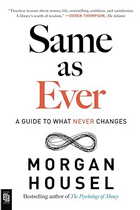Same as Ever by Morgan Housel
Like in his other book, “The Psychology of Money,” Morgan Housel has once again managed to both educate and entertain. This book contains 23 “short” stories that will leave you in deep thought for a “long” time. Morgan Housel has presented his thoughts concisely and eloquently. He shows how things have always been the same over decades and reading more history will make you more relaxed about the future. Be it financial crisis or pandemics or wars or climate catastrophes we as humankind have always managed to bounce back and move on. This doesn’t mean we should follow the path of doom, but it is best to remember that there is a way out. I have put down a few sentences, phrases I really liked. • Montesquieu wrote 275 years ago, “If you only wished to be happy, this could be easily accomplished; but we wish to be happier than other people, and this is always difficult, for we believe others to be happier than they are.”
• When an economy is stable, people get optimistic. • When people get optimistic, they go into debt. • When they go into debt, the economy becomes unstable. Minsky’s big idea was that stability is destabilizing. A lack of recessions actually plants the seeds of the next recession, which is why we can never get rid of them.
• Paranoia leads to success because it keeps you on your toes. • But paranoia is stressful, so you abandon it quickly once you achieve success. • Now you’ve abandoned what made you successful and you begin to decline—which is even more stressful. It happens in business, investing, careers, relationships—all over the place.
• There’s a scene in the movie Lawrence of Arabia in which Lawrence puts out a match with his fingers and doesn’t flinch. Another man watching tries to do the same and yells in pain. “It hurts! What’s the trick, then?” he asks. “The trick is not minding that it hurts,” Lawrence says. This is one of the most useful life skills—enduring the pain when necessary rather than assuming there’s a hack, or a shortcut, around it.
• Evolution is ruthless and unforgiving—it doesn’t teach by showing you what works but by destroying what doesn’t.
• Things you don’t understand create a mystique around people who do. If you say something I didn’t know but can understand, I might think you’re smart. If you say something I can’t understand, I might think you have an ability to think about a topic in ways I can’t, which is a whole different species of admiration. When you understand things I don’t, I have a hard time judging the limits of your knowledge in that field, which makes me more prone to taking your views at face value. And many more which I hope you get to read yourself.
© 2025 Sindhuja Cheema Enzinger. All Rights Reserved.

